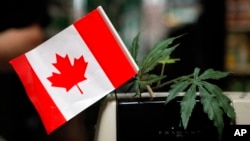Canadian Prime Minister Justin Trudeau announced Wednesday that marijuana will be legal nationwide beginning October 17.
The declaration comes after both houses of parliament voted to legalize the drug for recreational use, making Canada the first G-7 country to do so, and the second in the world following Uruguay.
Trudeau welcomed the vote, tweeting: "It's been too easy for our kids to get marijuana — and for criminals to reap profits. Today, we change that."
The law allows Canada's 10 provinces and three territories to set their own regulations regarding the sale and distribution of cannabis.
In Alberta, recreational marijuana will be available at more than 200 private retailers, but it will be sold only at 40 state-run shops in Ontario. Others, like New Foundland and Labrador, will allow it to be sold at some grocery shops.
It also will be available only to people over the age of 18. Selling it to a minor will bring stiff penalties of up to 14 years in prison.
But many questions remain, including how police will test motorists suspected of driving under the influence, what to do about those with prior marijuana convictions, and how the rules governing home cultivation will work.
The provinces of Quebec and Manitoba already have decided to ban home-grown pot, even though the federal bill specifies that individuals can grow up to four plants per dwelling.
In the neighboring U.S., nine states and the District of Columbia have legalized marijuana. California launched the United States' biggest legal marijuana marketplace January 1.







